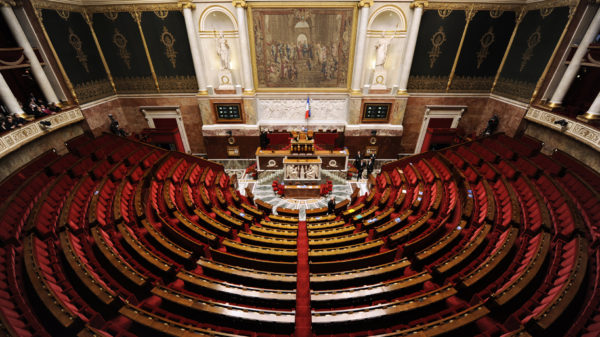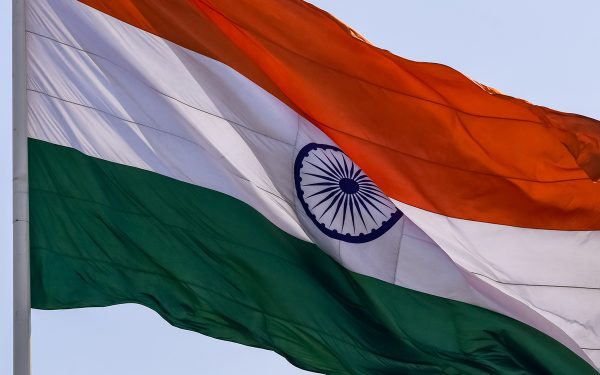World
Out in the World: LGBTQ news from Europe and Asia
Latvia’s civil unions law took effect Monday

LATVIA
Latvia’s law allowing same-sex couples to form civil unions came into effect Monday, and the first queer couples have already registered their unions in the Baltic nation.
Maksims Ringo and Janis Locs were the first same-sex couple to register their civil union. They did so in a ceremony at a legal office in the capital, Riga, where they exchanged silver rings, stating that they were saving gold rings for a date when Latvia legalizes same-sex marriage.
“I feel excited, kind of emotional about it as well because it is a really big step and not only for us, for the country itself. And being first, it’s all the publicity that comes with it as well. It kind of is a bit, I would say, a bit stressful, but at the same time I feel happy that we can finally do it,” Locs told Reuters.
Latvia amended its constitution to ban same-sex marriage in 2005, but in 2020, the Constitutional Court ruled that the state must give same-sex couples the same benefits that straight married couples have. In 2022, a deadline imposed by the court lapsed, and couples began applying to the courts to have their relationships recognized.
Last year, the Latvian parliament finally passed a law formalizing same-sex civil unions, but the compromise legislation has frustrated some LGBTQ activists in the country as it leaves out key rights demanded by same-sex couples. Latvia’s civil unions do not allow couples to adopt children, nor do they get key inheritance rights, they’re concluded at a notary office instead of at the civil registry, and the government still will not recognize foreign same-sex marriages.
The bill was also bitterly opposed by conservative, anti-LGBTQ groups. They attempted to force a referendum to block the bill but were unable to come up with the required signatures before the legal deadline.
With legal civil unions in Latvia, all but five EU countries recognize some form of same-sex union: Lithuania, Poland, Slovakia, Bulgaria, and Romania.
In neighboring Lithuania, a civil union bill awaits a final vote in parliament but has stalled amid infighting between liberal and conservative factions of the coalition government. This week, the liberal faction threatened to block the appointment of a European commissioner unless the conservatives agreed to pass the bill.
In Poland, the governing coalition appears to have finally agreed to pass a civil union bill, albeit one that has been watered down significantly. The resulting bill will not allow any adoption rights, nor a common surname, and will be concluded by notaries and without a ceremony rather than civil registries. The government hopes to bring the bill forward this month.
The European Court of Human Rights has ruled that all member states must provide some form of civil union to same-sex couples to be in compliance with the nondiscrimination and family rights guaranteed by the European Convention on Human Rights.

FRANCE
Voters gave a big boost to the far-right National Rally party in Sunday’s first-round parliamentary elections, with the Rally taking 33 percent of the vote, while the left-wing New Popular Front took 28 percent, and President Emmanuel Macron’s centrist Together bloc took 21 percent.
Parties are now jockeying for voter support in the second round, and NPF and Together have begun discussions at mutual endorsements to block the National Rally.
In France’s system, if no candidate in a given district wins 50 percent of the vote, the top two vote-getters, and any candidate who gets at least 12.5 percent of registered voters advances to the second round, which is decided by plurality vote. Because of higher-than-usual turnout of 67 percent, there are a large number of three-way races in the second round — over 300 according to official results, when the previous record was 76.
The left-wing NPF has announced it will withdraw any candidates who advanced and placed third on the ballot, in order to create a “republican front” against the National Rally. While Macron has not made a formal statement on withdrawing third-place candidates, his prime minister, Gabriel Attal, has called on third-place candidates to step aside.
The National Rally has a long history of campaigning against LGBTQ rights but has not made that central to its program in this election, where it has focused on pocketbook issues and rejection of immigration. The National Rally has long opposed same-sex marriage, and its current leader has campaigned and voted against allowing lesbians to access IVF and supports a bill to ban gender care for minors.
Several reports have emerged of National Rally supporters committing homophobic attacks in France.
A group of National Rally supporters allegedly attacked a gay teenager in Paris after the results of last month’s European Parliament elections were announced and National Rally was shown to win the largest number of sets. They were reported to have shouted “You’ll see when Bardella is in power and Hitler comes back!” and “In three weeks, we will be able to smash up f*gs as much as we like. I can’t wait.” The attackers were arrested.
GEORGIA
A package of extreme anti-LGBTQ bills sailed through first reading in the Georgian parliament on a 78-0 vote that was boycotted by most of the country’s opposition parties.
Georgia has been rocked by protests since the governing Georgian Dream party introduced a passed a “foreign agents” law, which requires any organization that receives funding from out of the country to register with the government as a foreign agent. The law was inspired by a similar law in Russia and was designed to undermine opposition groups, media, and nongovernmental organizations that are often critical of the government.
The anti-LGBTQ bills are an extreme package of legislation that was also inspired by Russia. The bills ban recognition of any same-sex relationships, forbid recognition of gender other than birth sex, forbid any medical treatment for gender change, and criminalize any advocacy for LGBTQ rights. The government says it hopes to pass the legislation by the fall ahead of national elections in October.
The bills are also designed to undermine the opposition, by forcing them to defend LGBTQ rights, which remain deeply controversial in the conservative Christian country. Opposition leaders have also made it clear that their boycott of the bill does not mean they support LGBTQ rights.
Both the anti-LGBTQ bills and the foreign agents bill have put the country on a collision course with the EU, which it has expressed a desire to join, and which granted it candidate status last year.
EU accession is very popular among the Georgian public, but the Georgian Dream party is more closely aligned with Russia, and frequently demonizes the EU by equating its values with LGBTQ rights.
Last week, EU candidates Moldova and Ukraine opened formal negotiations to join the bloc, although it is expected that it will be many years before membership is granted.

INDIA
The high court of India’s Kerala state upheld the right of LGBTQ people to live autonomously, as it rejected a petition from the parents of a 23-year-old who sought to have their daughter committed to a mental institution to “treat her sexual orientation.”
The young woman had fled her family and was living with her partner, a transgender man. Her family members repeatedly attempted to violently abduct her from her new home.
The court ruled that the woman has a right to live her life on her own terms and that sexual orientation is an innate part of a person’s identity.
The court also directed the parents to hand over all of their daughter’s personal documents, which they had been withholding, in an attempt to force her to return to them, and the court warned the family against committing violence against her.
Same-sex relationships are not illegal in India, although last year the Indian Supreme Court ruled that the government does not have to recognize same-sex marriage, leaving that question to parliament.
HONG KONG
Ten same-sex couples from Hong Kong were legally married in the U.S. over the internet this week, in a mass ceremony to celebrate Pride week.
The 10 couples took advantage of a program available through the state of Utah, which allows people to get married via an internet ceremony.
Utah has become a go-to destination for same-sex couples seeking to get married even though they live in countries that don’t recognize same-sex marriage. Utah allows couples to get married even if they’re not physically present in the state, while most states require couples to at least be present, if not resident in the state.
Hong Kong does not currently allow same-sex marriage, although last year its Court of Final Appeal ruled that the local government should offer some form of relationship recognition to same-sex couples within two years. That deadline comes up next September.
“In Hong Kong, there’s not yet a way to go to a marriage registry to get married, but there’s still this way we can offer for them to realize their dreams of getting married,” wedding organizer Kurt Tung told the Associated Press.
Mexico
Gay couple claims Puerto Vallarta wedding venue discriminated against them
Jeremy Alexander and Ryan Sheepwash wanted to get married at Sheraton hotel

A gay couple claims a hotel in a Mexican resort city that is popular with LGBTQ travelers discriminated against them when they tried to book their wedding.
Jeremy Alexander and Ryan Sheepwash in a TikTok video said they contacted the Sheraton Buganvilias Resort and Convention Center in Puerto Vallarta about holding their wedding at the property.
The couple, who live in Vernon, British Columbia, provided the Washington Blade with an invoice that Gabriela Espinoza, a wedding planner at the property, sent them on Jan. 17, 2025.
The invoice said 25 “deluxe ocean view room — all inclusive” rooms cost $970 a night. The total cost for the 25 rooms was $72,750.
Alexander in the TikTok video said it took Espinoza three months to send them the quote. The property, according to Alexander, requested a $36,000 deposit for half of the rooms.
“It’s not reasonable,” he said. “No one can afford that.”
Alexander said Espinoza told him and Sheepwash that the earliest they could have their wedding at the property was March 2027. Alexander in the TikTok video said he and Sheepwash asked a straight friend to “request a quote just to see apples to apples what it looks like.”
Ximena Esparza, another wedding planner at the property, on Feb. 7, 2025, sent the friend a quote for 25 rooms for a hypothetical wedding that was to have taken place from Feb. 19-26, 2026.
The quote for a “deluxe package” for 50 people was $8,500 and required a 20 percent deposit of $1,700.
“We just feel defeated,” said Sheepwash in the TikTok video. “It’s not fair because we love each other and we really want to get married, and we want to make it special and we want to make it perfect.”
@illuminaughtytriangle So disappointed that my fiancée and I got discriminated against by #Sheraton in #puertovallarta ♬ original sound – Jeremy Alexander
The Blade in 2019 reported the Sheraton Buganvilias Resort and Convention Center refused to allow Josh Rimer, a gay Canadian vlogger and television host who is also Mr. Gay Canada 2019, and his then-fiancé to hold their wedding at the property.
The invoice that Espinoza sent to Alexander and Sheepwash notes the hotel is “operated under license from Marriott International, Inc., or one of its affiliates.”
A spokesperson for Marriott, which is based in Bethesda, Md., and is Sheraton’s parent company, in response to Rimer’s allegation said the corporation reached out to him to express “our sincerest apologies for his experience.”
“We are troubled and greatly concerned about the experience reported by Mr. Rimer. Marriott has long been committed to providing an environment where all are welcome including our LGBTQ guests and their loved ones,” said the spokesperson. “In addition, we are looking further into the matter to better understand what happened and do what we can to prevent hurtful experiences like this from happening again.”
A Marriot spokesperson on Thursday told the Blade the company has “reached out to Mr. Sheepwash and Mr. Alexander to learn more about their experience and are working with the property to offer a solution.”
“The Sheraton Buganvilias has been active in the LGBTQ+ community in Puerto Vallarta for years, hosting LGBTQ+ weddings and groups and also supporting Pride events in Puerto Vallarta,” said the spokesperson. “Marriott remains steadfast in our commitment to ensure guests are treated with respect and understanding.”
Chile
Transgender woman sues Chilean national police
Isabella Panes alleges she suffered harassment, exclusion after becoming ‘carabinera’

Isabella Panes in 2022 was celebrated as a symbol of inclusion.
Wearing an olive green uniform and a shy smile, she appeared in the media and on social media as Chile’s first trans female “carabinera” or national police officer. The Carabineros promoted Panes as a sign of openness, but that story has become a dramatic case of institutional discrimination.
Panes today faces the Carabineros in court.
She has denounced a series of systematic acts of exclusion, harassment at work, and violation of fundamental rights that she and her defense team maintains pushed her into a mental health crisis that almost cost her her life.
“My hope is that tomorrow we will be able to live in a world of equality for all. Just that we understand that we are human beings and we have to make life a lot easier for each other,” Panes told the Washington Blade during an exclusive interview.
Panes, 29, grew up in Laja in the Biobío region.
She dreamed of becoming a “carabinera” since she was a child, despite the fact that she faced discrimination because of her gender identity. After years of effort, surgeries and a difficult transition, Panes enrolled in the Carabineros Academy in 2021.
Panes faced the challenge of making her medical processes compatible with the physical demands of training. Even so, she graduated with good marks, and was recognized as part of the new institutional image the Carabineros wanted to project after the 2021 social unrest tarnished their image.
This institutional support disappeared after the media campaign.
Panes alleges she was marginalized from operational duties and relegated to administrative tasks, despite her interest in and training to patrol the streets like any other officers.
“I joined the Carabineros to serve, not to be a marketing decoration,” she said. “I was offered to be part of the change, but only if I kept quiet and accepted the mistreatment.”
The accusations against the Carabineros are serious: Constant mockery by colleagues, dissemination of private information about her personal life, invasive questions about her body and sexual orientation. Panes’s legal representatives said this abuse took place within a context where the institution did not take effective measures to protect their client.
The Carabineros Social Security Administration, known by the Spanish acronym Dipreca, also refused to cover her transition-related medical procedures, arguing they were “aesthetic,” despite medical reports that indicated their importance for Panes’s mental health and well-being.
Panes in January attempted to kill herself by suicide. She managed to survive after calling Chile’s 4141 mental health care number for help.
“They were killing me slowly, from the inside,” said Panes.
Panes has brought her case to the Supreme Court after a lower court ruled in favor of Dipreca’s decision to not cover her medical treatments.
Her legal team in a lawsuit has also accused the Carabineros of employment and systematic discrimination. Panes is seeking damages and institutional reforms.
“The Carabineros used Isabella to clean up its public image, but when it came to guaranteeing real rights, they abandoned her,” said Javiera Zúñiga, spokesperson for the Movement for Homosexual Integration and Liberation, a Chilean advocacy group.
“It is not enough to show up at the Pride march,” she added. “True inclusion is demonstrated in deeds, in daily dealings, in respect for the dignity of all people.”
Panes’s case starkly exposes the limits of diversity policies when there is no deep institutional commitment to implement them.
“I am no longer afraid,” said Panes, ”What happened to me cannot happen again. Not for me, but for all those who come after me.”
Brazil
US lists transgender Brazilian congresswoman’s gender as ‘male’ on visa
Erika Hilton has represented São Paulo since 2022

A transgender Brazilian congresswoman says the U.S. issued her a visa that listed her gender as “male.”
Erika Hilton on Wednesday wrote on her Instagram page that she requested a visa that would have allowed her to travel to the U.S. in order to participate in the Brazil Conference at Harvard University and the Massachusetts Institute of Technology.
The conference took place earlier this month.
“I was classified as ‘male’ by the U.S. government when I went to get my visa,” wrote Hilton, who added a visa she received from the U.S. in 2023 listed her gender as “female.”
Hilton is a Black travesti and former sex worker from São Paulo who won a seat in the Brazilian Congress in 2022. The Washington Blade spoke with Hilton shortly after her election.
“It is a big responsibility … but I feel very honored,” said Hilton. “I very much like to be able to be a representative for my people, and the more than 250,000 people who voted for me have confidence in me,” she said after she spoke at a rally in support of now Brazilian President Luiz Inácio Lula da Silva in a São Paulo square. “This demonstrates that our work has the potential to have a gigantic reach; where we can advance efforts to end death, poverty, misery, genocide that we have.”
President Donald Trump in his inaugural speech announced the federal government’s “official policy” is “there are only two genders, male and female.” The Trump-Vance administration has also banned the State Department from issuing passports with “X” gender markers.
Germany and Denmark are among the countries that have issued travel advisories for trans and nonbinary people who plan to visit the U.S. These warnings come ahead of WorldPride, which is scheduled to take place in D.C. from May 17-June 8.
Hilton said she is “not surprised” the U.S. issued her a visa with a male gender marker.
“I’m also not surprised by the level of hatred and fixation these people have with trans people,” she said. “After all, the documents I presented are rectified, and I’m registered as a woman, even on my birth certificate.”
Hilton further accused the U.S. of “ignoring official documents from other sovereign nations, even from a diplomatic representative.”
“At the end of the day, I’m a Brazilian citizen, and my rights are guaranteed and my existence is respected by our own constitution, legislation, and jurisprudence,” she said.
Editor’s note: Duda Salabert, another transgender Brazilian congresswoman, also said the U.S. listed her gender as “male” on her American visa.
-

 District of Columbia4 days ago
District of Columbia4 days agoFinal push to raise funds, fill D.C. hotels as WorldPride nears
-

 District of Columbia4 days ago
District of Columbia4 days agoReenactment of 1965 gay rights protest at White House set for April 17
-

 Maryland4 days ago
Maryland4 days agoFreeState Justice: Transgender activist ‘hijacked’ Moore’s Transgender Day of Visibility event
-

 El Salvador2 days ago
El Salvador2 days agoGay Venezuelan makeup artist remains in El Salvador mega prison












